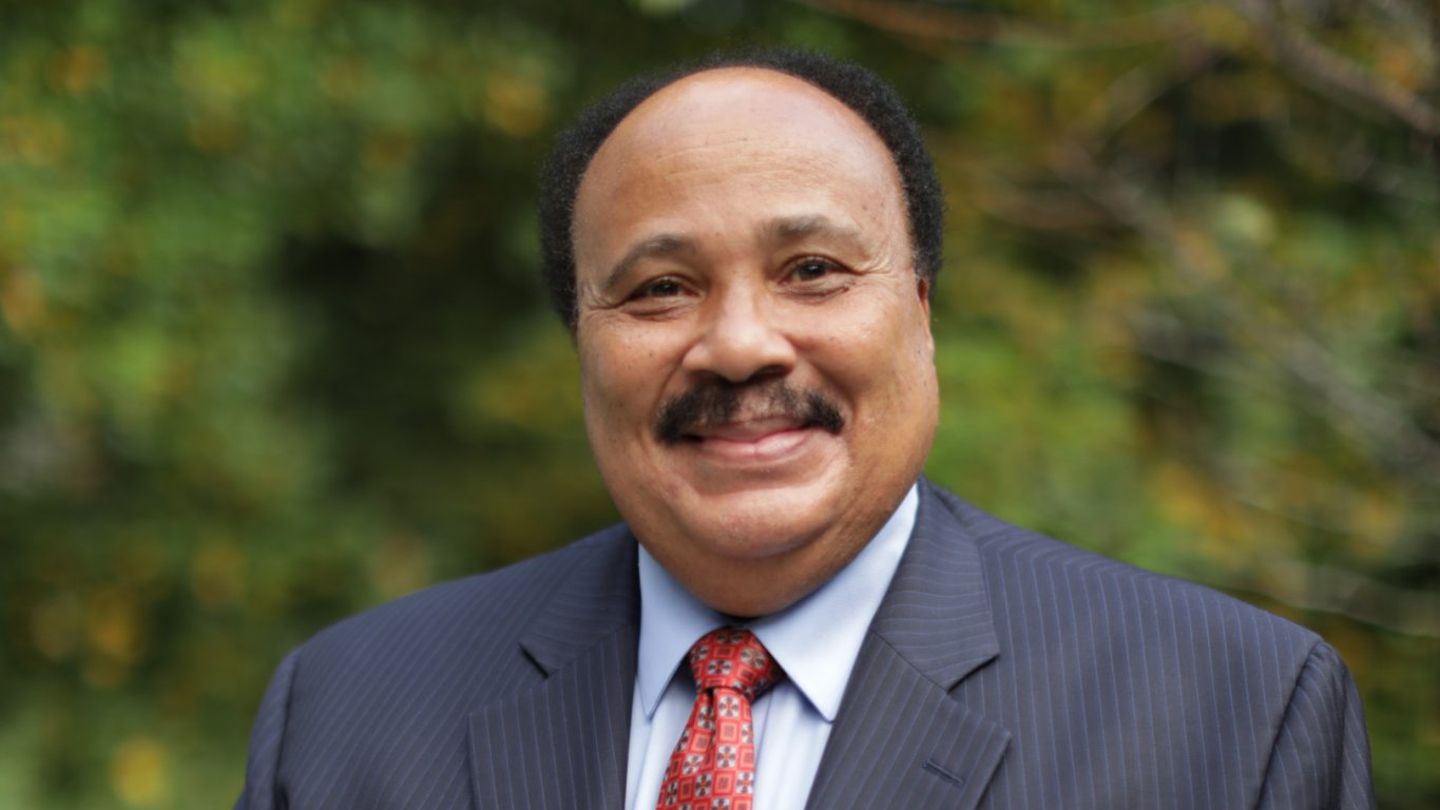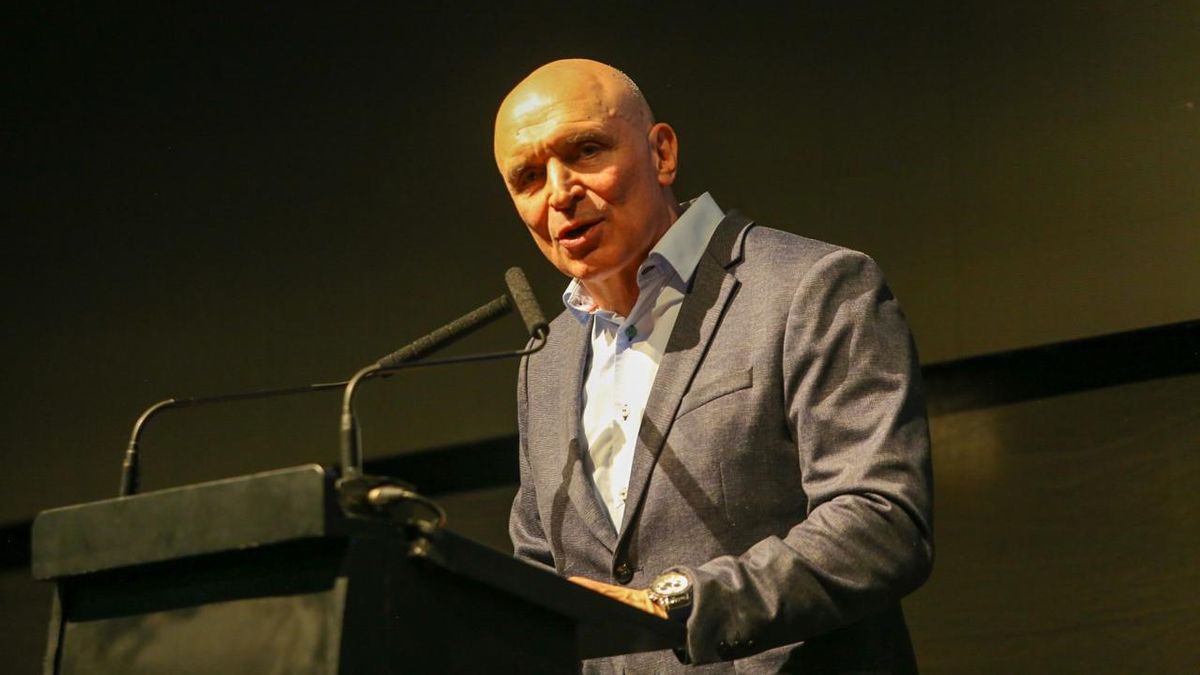If it’s up to Martin Luther King III, Kamala Harris can’t become US President fast enough. A conversation about his fascination with the politician – and his father’s dream.
Martin Luther King III was ten years old when his life changed forever. On April 4, 1968, the famous civil rights activist Martin Luther King was shot while giving a speech on the balcony of the Lorraine Hotel in Memphis. The world lost one of the greatest human rights fighters of its time. And Martin Luther King III lost his father.
King still remembers the moment when the breaking news of his death flashed across the television. He remembers April 8, four days after the assassination, just as clearly, when his mother drove him and his siblings to a demonstration in Memphis to continue her husband’s work.
As the eldest son, King followed in his father’s footsteps. In his late 20s, he entered local politics, led protest marches and fought against police violence. In the 2008 election campaign, the human rights activist became one of President Barack Obama’s most prominent advocates.
Today, King is 67, has a daughter of his own – and recognizes his father in Kamala Harris.
It has been 61 years since your father gave his famous “I Have a Dream” speech. The country that your father dreamed of seems far away at the moment, the mood is heated in the USA, the nation is divided. Will your father’s dream always remain just that – a dream?
Parts of his dream have already become reality. But when you look at the bigger picture, we see that while many individuals are doing well, the majority are still struggling. I’m thinking of the Supreme Court turning back the clock, the disparities in healthcare, the unequal educational opportunities. Just this week, we saw a former president question the identity of Vice President Kamala Harris. It’s crazy that in 2024, a person still has to justify themselves because of the color of their skin, their gender, or their sexual orientation. It just goes to show how much work we still have to do as a society.
Her 16-year-old daughter Yolanda recently spoke to her Grandparents apologized for the state of the world. What was going through your mind?
I am very proud of my daughter, but my first reaction was, oh, that’s awful. All parents want a better world for their children, and it shouldn’t have to be the other way around. They say a people who don’t remember their history are doomed to repeat the mistakes of the past. We keep making the same mistakes because as a society we haven’t learned from our past. Instead of moving forward as a country, we are moving backwards in some areas, passing laws that create barriers instead of breaking them down. But as long as fear and division prevail, a society will never reach its full potential. That means we must redouble our efforts to overcome these setbacks.
What do you think your father would say to people today?
His message would be the same as it was then. He and my mother spent their whole lives trying to bring people together and bring out the best in each of us. They had a vision of a society where freedom, justice and equality apply to all. That vision has not yet been realized.
Many people now believe that self-fulfillment is the most important thing. My father would say that the fulfillment of others can be more important than your own. We saw that with President Biden’s resignation. His human nature told him: Only I can get the job done. But he put the country above his own interests and thus opened the door for his vice president.
What do you think about Kamala Harris?
I’ll be honest: When Harris announced her candidacy, I was thrilled. My wife and I publicly endorsed her that same day. And we weren’t alone. When you look at the fact that she raised $100 million in 24 hours and that over half a million volunteers joined the campaign in the first week, it’s just incredible. We see blacks, whites, Latinos, women and men, young and old, all calling for Harris to be supported. It’s a unifying moment, and I think that energy is only going to grow.
Many compare this moment to Obama’s 2008 election campaign.
We saw a lot of enthusiasm for President Obama. But I think Vice President Harris takes it to a new level. I was at her rally in Atlanta with my daughter and the whole place was electrified. It was exhilarating. In my 67 years, I have never seen such a level of enthusiasm before an election. Another important difference is that there are many more women involved in this campaign. Simply because Harris is a woman.
For a long time, many Democrats have also expressed concern that the country is not yet ready for a black president.
I think the momentum is there for them. Harris is a very smart woman. She is highly qualified for the job, and she has proven that she is a bridge builder. Unlike her opponent, who wants to build walls instead of bridges. Donald Trump has shown time and time again that he is not interested in building consensus. He is only interested in doing what Donald Trump wants to do. He has publicly announced that he will become a dictator on day one. That should scare people a lot more than it seems to be doing right now. For Harris, maintaining the energy and enthusiastic momentum will be crucial. But it will be a mammoth task that will require a lot of work. Although women have been the backbone of every civil rights movement, we still live in a chauvinistic society. We need to change the idea that a woman cannot do certain things.

© Drum Major Institute
Martin Luther King III (* October 23, 1957 in Montgomery, Alabama) is an American human rights activist and the eldest son of the famous civil rights activist Martin Luther King. As chairman of the civil rights organization “Southern Christian Leadership Conference” he led protest marches and campaigned against police violence. In the 2008 election campaign he became one of the most prominent advocates of President Barack Obama.
He launched the “Realizing the Dream” initiative with his wife and daughter in January 2024. The goal is to motivate young people nationwide to do 100 million hours of volunteer service by the time of his father’s 100th birthday in 2029. “We want to create a movement that doesn’t matter what political affiliation you belong to, what religion you practice, or what sexual orientation you have,” said King. “It’s about creating something that is bigger than yourself.”
And all this in less than 100 days.
The biggest challenge is to maximize voter turnout. My father always said that a people without the right to vote is a powerless people. And that one of the most important steps we should take is to go to the voting booth. Because that is the only place where we all have equal opportunities. I think Vice President Harris is the right person to reach out to people of different groups, to motivate them and to make them understand why it is so incredibly important to vote this year. But the truth is that no matter how the election turns out, half the nation will not agree with the result. If Harris wins, her job will be to do what she promised on the campaign trail, which is to bring people together. To say: OK, we may not agree on this issue, but let’s find a way to work together..
That sounds like your father’s dream.
That’s true. In some ways, Harris is a reflection of my father.
What would your father say to his reflection?
I think my father would be extremely proud of this moment in our society, but probably also a little disappointed that we didn’t get there sooner. Many countries have had women as heads of state, and the United States – which always likes to claim it leads the world – may only now have one.
When people hear the name Martin Luther King, they think of the famous civil rights activist, the brilliant orator. How do you remember your father?
Whenever my father went on a trip, my mother and we children would take him to the airport. On the highway, we would always pass an amusement park called Funtown. In the early 60s, blacks were not allowed in amusement parks. So we saw the bumper cars, the Ferris wheel and lots of white kids – and we said, Dad, we want to go to Funtown too. My father replied, we can’t go today, but I’m working on it. And he worked on it, and in 1963, when I was just six, we all went to Funtown together. Riding the roller coaster with my father is still one of my fondest memories of him..
Source: Stern
I have been working in the news industry for over 6 years, first as a reporter and now as an editor. I have covered politics extensively, and my work has appeared in major newspapers and online news outlets around the world. In addition to my writing, I also contribute regularly to 24 Hours World.




